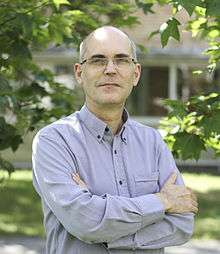Matthew Collins (academic)
| Matthew Collins | |
|---|---|
 Matthew Collins | |
| Residence | Copenhagen, Denmark: York, Yorkshire |
| Nationality | British |
| Fields | Bioarchaeology |
| Institutions | University of York: University of Copenhagen |
| Alma mater | Bangor University |
| Thesis | Taphonomic processes in a deep water Modiolus-brachiopod assemblage from the west coast of Scotland (1986) |
| Known for | Work on biological, molecular and scientific approaches to archaeological material |
Matthew Collins is a Niels Bohr Professor at the University of Copenhagen[1] and professor of biomolecular archaeology at the University of York[2] where he founded BioArCh, a collaboration between the departments of biology, chemistry and archaeology (BioArCh: Biology Archaeology, Chemistry).
His research focuses on the persistence of proteins in ancient samples, using modelling to explore the racemization of amino acids and thermal history to predict the survival of DNA and other molecules.[3] Using a combination of approaches (including immunology and protein mass spectrometry) his research detects and interprets protein remnants in archaeological and fossil remains.
With former PhD student Dr Mike Buckley he developed ZooMS (Zooarchaeology by Mass Spectrometry)[4] a way to rapidly identify bone and other collagen based materials using peptide mass fingerprinting.
In 2014 he was elected a Fellow of the British Academy.[5][6]
References
- ↑ "Niels Bohr Professors". Danish National Research Foundation. 2016-05-20. Retrieved 2016-10-01.
- ↑ "Prof. Matthew Collins - Archaeology, The University of York". York University. 2014-07-17. Retrieved 2014-07-21.
- ↑ "Thermal Age Website". Retrieved 2014-10-25.
- ↑ "Van Doorn, N. L. in Encyclopedia of Global Archaeology 7998–8000 (Springer New York, 2014)".
- ↑ "British Academy announces 42 new fellows". Times Higher Education. 18 July 2014. Retrieved 18 July 2014.
- ↑ "Academic honoured by fellowship (From York Press)". York University news. Retrieved 2014-07-21.